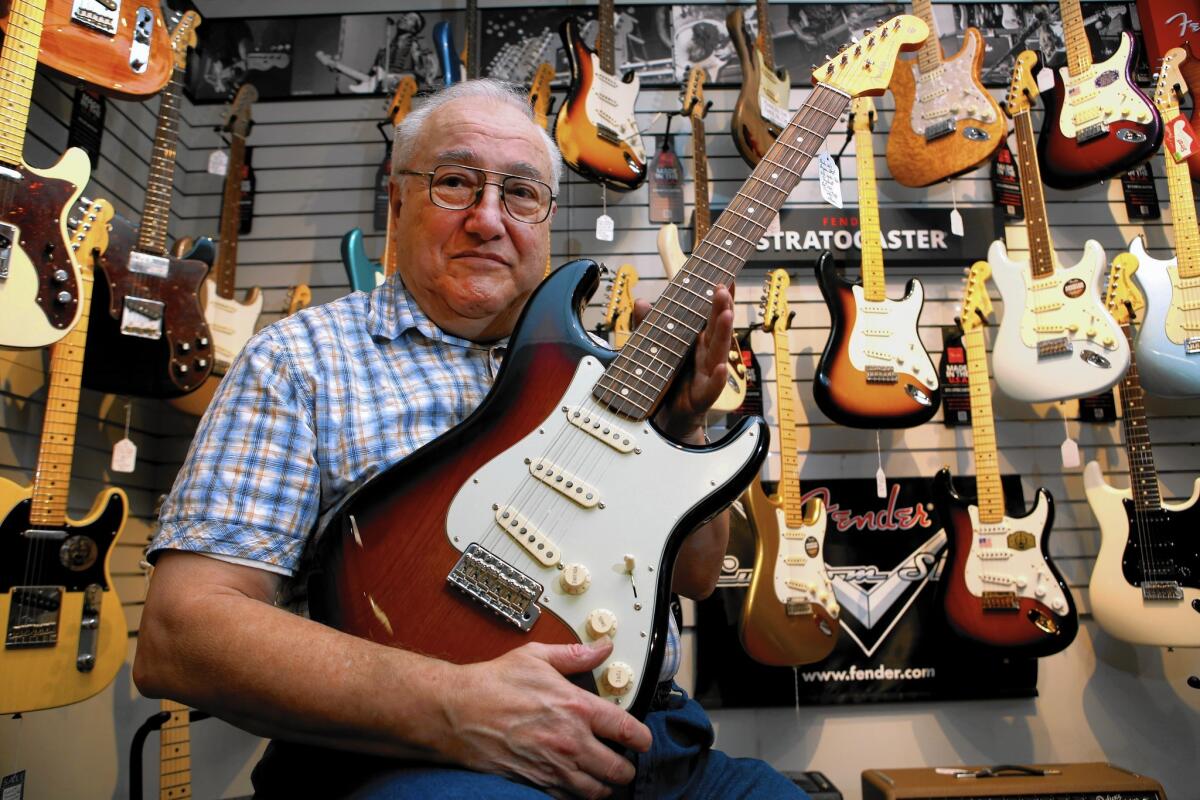Fenderâs move to sell instruments directly to musicians upsets dealers

Fenderâs curvy Stratocasters, Telecasters and Jazz Basses have been must-have features of guitar shop walls for decades.
Music retailers, including mom-and-pop shops and big national chains such as Guitar Center, have been among the last bastion of businesses to survive online competition. Consumers like to try before they buy.
But just before Christmas, Fender Musical Instruments began selling directly to musicians on its website.
Bricks-and-mortar retailers, already hurt by e-commerce sites such as Amazon and EBay, worry that Fenderâs online sales could increase competition and even offer lower prices. They also are concerned that other manufacturers such as Gibson Guitar, C.F. Martin & Co. and Ibanez Guitars may pursue similar tactics.
âItâs hard to not call it a bit of a betrayal,â said Gabriel OâBrien, sales manager at Larryâs Music Center in Wooster, Ohio, which dropped Fender as a supplier a year ago, partly because it anticipated Fender would start selling its guitar lines through its site. âI feel it undercuts dealers whose backs these brands were built on.â
The issue could come to a head this week on the floor of the Anaheim Convention Center at the music products industryâs biggest gathering, the National Assn. of Music Merchants annual trade show.
Starting Thursday, thousands of manufacturers and brands will use the convention to peddle their wares to the tens of thousands of potential buyers who visit the NAMM Show each January. Last year, about 96,000 members of the music products industry registered for the show.
Direct-to-consumer sales are expected to be a topic of intense discussion as buyers meet with Fender representatives. Some shop owners are so concerned that they plan to buy less merchandise from the manufacturer, said retailers, many of whom did not want to be named for fear that speaking publicly could damage relations with Fender.
Some are considering not re-upping as Fender dealers.
For its part, Fender said the introduction of sales through its website would benefit retailers, still their most important partners for getting Strats and Telecasters in the hands of musicians.
The site gives an option to add a Fender guitar to their âcart,â but also tells musicians the local dealer where they can try out and buy one. The company also does not undercut prices that can be found at retailers.
Richard McDonald, an executive vice president at Fender, said selling directly to customers will help make musicians more loyal to the brand and help increase sales at local shops.
âIf this works, their businesses will grow,â he said of retailers. âThis strategy is about elevating the brand and getting closer to customers.â
Not all retailers believe that.
They say if direct sales catch on, players may try out new instruments in physical stores and then order them online from manufacturers, the way many people purchase items such as personal electronics on Amazon after visiting their local Best Buy. Consumersâ behavior has changed so much that they now order eyeglasses online, through such firms as Warby Parker in New York, or even electric cars directly from Tesla.
Store owners have seen Fenderâs direct sales efforts coming for months.
The company unveiled the plans in August at a meeting with dozens of top dealers at its Corona factory. Many were caught off guard, said dealers who attended the meeting. Some left the meeting in anger.
Ken Grayson, who owns Graysonâs Tune Town musical instrument shop in Montrose, was in attendance and said the reaction was intense.
âOne guy walked out of the meeting and said, âIâm a new dealer, and Iâm sorry for that now,ââ said Grayson, 71. Graysonâs, a longtime Fender dealer, has been in business since 1953.
By selling directly to shoppers, Fender is catching up to other industries including personal technology and sporting goods that have been selling online through manufacturer websites for years.
Modern consumers expect to be able to buy products from brands themselves, often at cheaper rates, retail experts said. Direct-to-consumer sales work best for shoppers in areas with limited access to retailers or who know what they want but canât find it at a nearby store.
âIn todayâs world weâve seen a much greater need for the brands to communicate with the consumer,â said Marshal Cohen, a retail analyst at NPD Group. âI can do a much better job of telling you what I want you to know about my product than I can if I rely on someone else. The game of telephone comes into play.â
But the musical instruments industry is different, experts, executives and retailers said. People tend to want to play the instrument theyâre interested in before spending more than a thousand dollars on it. For instance, a standard Stratocaster costs about $1,300 in retail shops and on Fenderâs site.
Dealers do more than just sell equipment too. They provide lessons and repairs that manufacturers donât offer.
Buying from a guitar shop can be a personal experience that the Internet canât replicate, said Keith Brawley, vice president of sales for popular acoustic instrument maker Taylor Guitars.
âMusicians often have a relationship with their dealer like some people have with their doctor,â said Brawley, who added that he understands why many retailers are unhappy. âI think it goes to the question of, Do dealers add value? And I think the answer is yes, they do. Dealers will help a consumer end up with a better choice.â
Even the big store chains are apparently concerned.
Guitar Center, the largest seller of musical instruments, declined to comment. But a person familiar with Guitar Centerâs strategy, who requested anonymity because of the sensitivity of the topic, said executives fear direct sales by manufacturers could hurt revenue at its 260 stores and its online retailer Musicianâs Friend.
Fender, which is privately held, has had its share of ups and downs since its founding in 1946 by Leo Fender. In 2012, the company announced plans for an initial public offering, but pulled back later that year. The firm is controlled by investment companies Servco Pacific Inc. of Honolulu and TPG Growth in San Francisco.
The company is also trying to limit the number of products it sells. At the same meeting where it disclosed its direct-to-consumer plans, Fender said it would cut its number of products 25% and focus on its core series of instruments. Last year, Fender also sold the Guild acoustic guitar brand to Cordoba Music Group.
Industrywide, guitar sales have been mixed, thanks to a robust supply of used instruments and shifting music tastes.
According to data from the Music Trades magazine, U.S. retail sales of acoustic and electric guitars accounted for $1.07 billion in 2013, the latest year for which figures are available. That was up 7% from the previous year. However, total shipments declined slightly.
Not everyone thinks direct sales will become a trend.
Brian Majeski, editor of the Music Trades, said concerns over the issue are probably overblown, and the bigger threat to retailers are used equipment sales through online outlets such as Amazon.
âIâm not aware of any other manufacturers rushing to follow suit, and no one I know of thinks the ability to buy a guitar on Fender.com will dramatically alter the distribution patterns of Fender products specifically, or music gear more generally,â he said in an email.
Still, retailers remain on guard because of Fenderâs latest moves.
âWeâre all holding our breath,â said Ken Daniels of Truetone Music in Santa Monica. âWeâre trying to cope with it. Weâre taking a wait and see attitude.â
More to Read
From the Oscars to the Emmys.
Get the Envelope newsletter for exclusive awards season coverage, behind-the-scenes stories from the Envelope podcast and columnist Glenn Whippâs must-read analysis.
You may occasionally receive promotional content from the Los Angeles Times.











